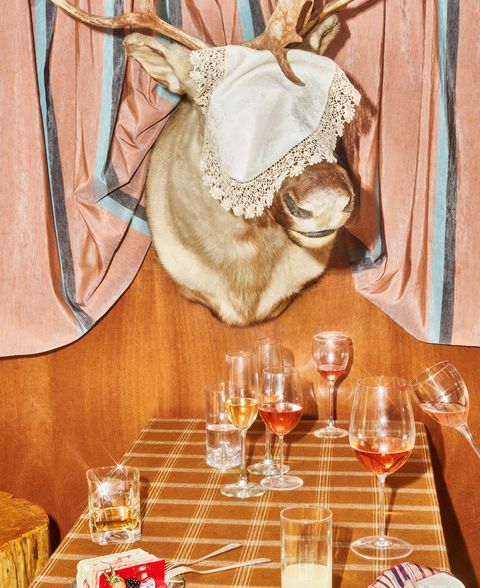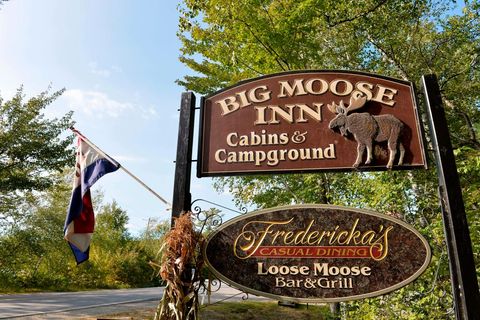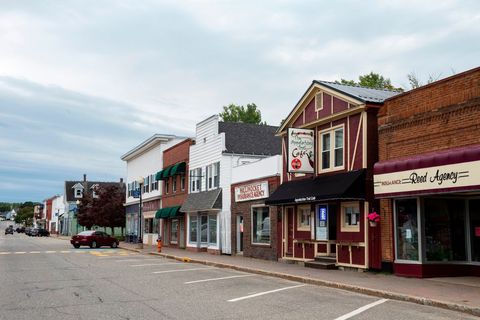The first thing the people of Millinocket would like you to know about the so-called “Millinocket wedding”—a coronavirus superspreader event in rural Maine last August—was that it didn’t even happen in Millinocket. Part of it happened in East Millinocket, a blink-and-you’ll-miss-it town of around 1,700 that calls itself “The Town That Paper Made,” and part of it happened at the now equally infamous Big Moose Inn Cabins & Campground, more than 20 minutes away, on the shores of Lake Millinocket and Ambajejus Lake, at the edge of the Katahdin wilderness. Millinocket itself is just about smack in between the two, but a good 10 minutes or so away from each.
“Most people in Millinocket had absolutely nothing to do with that wedding,” a longtime local business owner told me with a heavy sigh. “The bride got married in her father’s church in East Millinocket, and it was just beyond stupid and foolish for them to have a wedding. Most everybody here thinks that. They endangered a bunch of people.”
According to a later report by the Centers for Disease Control and Prevention (CDC), the August 7 wedding in the Millinocket region was ultimately linked to the infection of 177 people. Seven of them died, none of whom actually attended the event itself. Up until that point, Maine had weathered the pandemic remarkably well, with among the lowest COVID-19 transmission rates in the country. That had held true even through July’s tourist season, to the state’s great relief. Maine is the oldest state demographically in the country, with a population that’s highly vulnerable to the coronavirus, but its economy depends on money from tourism. All summer, there had been a collective unease among locals—not knowing whether to be more afraid that people would come, or that they wouldn’t. By late August, seemingly everybody here knew about the Millinocket wedding, and everything had changed.
The ceremony was held at the Tri Town Baptist Church, which the bride’s parents had helped found over two decades earlier. It’s a simple, sweet white structure at the north end of Main Street near a Family Dollar, which appears to be downtown’s biggest active commercial enterprise. The church was originally started by a pastor named Todd Bell, who’d arrived in the mill town in 1996, having been called to spread the gospel to the northern reaches. The bride’s parents joined his church at the beginning, back when meetings were held in the NAPA Auto Parts store.
Not very much is known about the wedding itself, because nobody who went to it has talked to the media. All members of the bride’s family, including the bride herself, declined interview requests, and most have set their social media to private.
But one of the three bridesmaids maintains Twitter and Instagram feeds that have alternated between public and private: Cherith Bell, Pastor Bell’s daughter. In June, she posted pictures from the bridal shower in East Millinocket, noting that she and the bride, #BestFriends22YearsAndCounting, were celebrating in the same little town where their mothers had had a joint baby shower for them some 22 years earlier. Cherith also posted pictures of the bridal party prior to the wedding ceremony—they’re in matching T-shirts, and they’re all smiles. In one picture, they’ve lifted the bride up and onto Cherith’s back—her mouth is open, mid-laugh. Cherith captioned the series “the one where we got her married” with sparkle emojis.
The bride and groom and five members of the groom’s family had flown in from California the day before the wedding, on Thursday, August 6. Per the executive order issued by Maine’s governor, all seven of them received negative test results for coronavirus shortly after they arrived and did not need to quarantine, according to the CDC report. Todd Bell was the officiant, and he arrived on August 6 as well, flying up from Sanford, in southern Maine, in one of the private planes he had acquired in partnership with the church for his “Wings With the Word” aviation ministry. Two days earlier, on August 4, Bell had spoken at a meeting hosted by the New England Baptist Fellowship in Rhode Island, a state that, at the time, had a COVID-19 case rate far higher than Maine’s. Given the length of time between events, he could not have quarantined when he returned, and it’s not known whether he took a test (Bell has stopped speaking to the media), but his later behavior suggests it’s unlikely.
After the wedding ceremony, a party of 55 headed to dinner at the Big Moose Inn. To get there from East Millinocket, you drive northwest out of town on Route 157, past the Katahdin Regional Industrial Park, a Maine Forest Service ranger station, and S&S Weapons, an indoor gun range that replaced a local topless bar in 2018. For much of the drive, there’s nothing but trees. By the time you get to Big Moose, you feel like you’re on the edge of the wilderness, because you are. The North Woods Trading Post next door to Big Moose has the last gas and Wi-Fi service for hundreds of miles.
Big Moose has been in owner Laurie Cormier’s family since 1976. Its on-site restaurant, Fredericka’s, is named for her mother. Cormier declined an interview request, as she has done with all media since the wedding, but she did release a lengthy statement in late August: “Our hearts go out to the family, those affected by the virus who were at the wedding, and those who have been impacted since then. There is no doubt that this virus is dangerous with wide-ranging impacts,” Cormier wrote. She detailed the safety measures the inn had taken and why the staff was confused by some of the state guidelines, adding, “We have given the Maine CDC our word, and we are giving our community and guests that same word that we will do—and are doing—better.” The inn’s lawyer, Paul Brown, said that prior to the wedding, the inn worked closely with the mother of the bride, designing a seating arrangement that would both please the wedding party and comply with state mandates. Guests were seated at tables six feet apart. There were signs up reminding people to wear masks and practice social distancing, and Big Moose staff members conducted temperature checks on everyone at the entrance. None were abnormal.
But within a week, it was clear that there had been an uninvited guest at the wedding. The first person to test positive for COVID-19 was a Maine resident and wedding guest who had a fever and cough the day after the event and tested positive on the 13th, six days after the ceremony, according to the CDC report. By the 20th, 30 people who had attended, worked, or otherwise been present at the wedding venue were positive for the virus—roughly half the attendees.
Maine’s CDC director, Nirav Shah, MD, later said at a press conference that the effect of the wedding was like opening a “giant tube of glitter” over the state. The virus ended up all over the place. Three days after the wedding, a guest who worked at an area school system went to an in-person school meeting even though that guest had started to cough; two school staff members subsequently tested positive within days, forcing all the area’s schools to delay their reopening by two weeks. Another spent the weekend after the wedding at home, infecting a parent, who infected another child, who was an employee at Maplecrest Rehabilitation and Living Center, a long-term care facility 100 miles southwest, in Madison. Ultimately, 40 people were infected there: 15 staff members and 25 residents. And another wedding guest experienced symptoms roughly a week later, but still reported to work from August 15 to 19 for daily eight-hour shifts at two separate correctional-facility housing units at the York County Jail, approximately 200 miles south, where 82 people became infected, including 48 inmates. “You open up glitter in Millinocket, and next thing you know you are finding traces of it at a jail complex in York County,” Shah said in late August. “It’s just emblematic of how quickly, silently, and efficiently [the virus] can spread.”
Big Moose Inn was issued an “imminent health hazard” citation, and briefly lost its license after a follow-up inspection discovered that the inn wasn’t following COVID-19 regulations—tables weren’t spaced six feet apart at the time of the inspection. They also hadn’t kept a list of everyone in attendance at the wedding; the inn’s lawyer told me that they hadn’t realized they needed to as long as they had contact information for the organizer. “The Inn and the mother of the bride had a good working relationship right up until the outbreak, so it was assumed that the family would be forthcoming with this information if needed,” Brown said in an email. “Unfortunately, as the outbreak grew and press attention began to focus on the wedding and its related events, the family refused to provide a copy of the guest list to either the Inn or apparently to the Maine CDC.”
As for the overall numbers, Brown says, Big Moose had believed it was compliant since the group was split into two separate rooms. And, he adds, “simply keeping the number of people at an event under 50 does not mean COVID-19 will not be present or spread; this can only be done by people actively taking personal precautions such as wearing a mask and maintaining social distancing.” Further, Brown wanted to remind people that “the post-wedding dinner was just one of three events that day,” and that “the attendees of the wedding and the dinner made the personal decision to not keep their masks on or to practice social distancing. The Big Moose Inn had no control over these decisions.”
The CDC worked backward on its investigations—contacting people who’d gotten positive results to figure out if they’d been to the wedding or had had contact with someone who’d been there. The report noted that a list of reception attendees was not available, and some infected people may have been missed. Therefore, the infection rate was a conservative estimate. “It’s a cautionary tale,” Parag Mahale, the primary author of the CDC report, told me. “It’s an opportunistic virus, and when people come together, actions in one community can have a ripple effect throughout the state.”
The first death occurred on August 21, exactly two weeks after the wedding. Theresa Dentremont was 88 years old and had spent most of the pandemic holed up over 20 miles away in a cabin with her 97-year-old husband, Frank. Her death was followed by six others, all at the Maplecrest facility. Not all of their names have been released publicly, but we know a couple of them: Mary Hughgill was 82 and loved snowmobiling. Helen Lynch was 86 and living with Alzheimer’s. None of the seven who died had actually attended any part of the wedding.
On September 1, with numbers rising in multiple counties as a result of the wedding held at the Tri Town church, Cherith Bell tweeted, “I’ve gotta say that even after a crazy week like this, the worst thing to happen to me is that I almost stepped on a snake yesterday while golfing.” As for the bride and groom, they had returned to California. On September 5, they walked onstage, along with around 120 unmasked graduates of West Coast Baptist College, in an indoor ceremony, where the speaker intoned that “we’re living in perilous times.” (The officiants made it clear the graduates were only allowed to remove their masks to receive their diplomas; they were repeatedly reminded to maintain social distance and wear masks otherwise.) “These young people are well aware that they’re going out to a battle,” the speaker said. “They’re going out to a warfare against the devil himself”—a nod to the school’s status as a pipeline to the Baptist ministry.
Todd Bell, meanwhile, appeared to continue to hold in-person services at Calvary Baptist, his home church in Sanford, despite the fact that cases were continuing to climb. He did not require attendees to wear masks, and he continued to let his choir sing without them, too. Unbelievably, on October 17, Bell participated in a second wedding—for his son in New Hampshire. Photos of the event show them lined up with five groomsmen and four bridesmaids. Everyone is maskless and grinning, except for a man off to one side: He appears to be the only person of color in the photo, and he’s dressed in a black button-down and pants, with a light blue surgical mask over his face. It looks as if he’s working a tripod.
By winter, “the Millinocket wedding” had basically become shorthand for a “coronavirus superspreader event.” Stories about COVID-19 that ran in local papers were sometimes accompanied by a photo of Big Moose, for no other reason than that everyone associated the one with the other. “The media has said that the wedding was in Millinocket, but it wasn’t,” says Dianne Perrio, who owns Steel Magnolia’s Nail & Hair, a salon in town. “I wouldn’t have had a wedding at this time, but they crucified the lady who owns the Big Moose Inn, and I just feel so bad, because it’s so hard for businesses right now. I can’t even imagine what the owner has gone through with all of this.”
“We became the poster child for bad behavior,” says Jim Plourde, a Millinocket native who owns a rubbish removal business and works as a part-time realtor. “I feel like [the Big Moose] has been thrown under the bus. And Millinocket was thrown under the bus.” Plourde says that in the weeks following the wedding, business in the town slowed down considerably. The tourist season in Maine is short to begin with, and in Millinocket, far from the coast and Acadia National Park, it’s even shorter. “Our time frame is tiny,” Plourde says. “Our windows are small. It kept the tourist dollars away, and when that happens, we all feel it. I don’t think it’ll necessarily be a lasting effect on the town, but I think the Big Moose will probably pay a price for a long time.”
In mid-November, just a few days after the CDC published its official report, a trial attorney announced he was representing the family of Mary Hughgill (the snowmobiler) and several other families who lost loved ones. He is also launching an investigation into a possible negligence suit against the Big Moose Inn.
I visited Big Moose one morning in mid-November. It was already shut down for the season, but there was a groundskeeper cleaning up leaves with a leaf blower. While we were talking, a car pulled in carrying a young woman, who was wearing a white face mask and a hooded sweatshirt that said, “Oh deer, I’m pregnant!” with little deer antlers attached to the hood. She didn’t want to give her name, but she said that she’d worked for Big Moose for seven years and had found out she was pregnant with her first child on August 1, six days before the now-infamous wedding. She said she’d spent months fielding phone calls and messages to the inn, many of them death threats, sometimes up to 20 a day. She looked exhausted; she said she was mad. “We were just bombarded, on all of our social media,” she told me. “Calls, calling me a murderer. But it wasn’t us, it was the wedding party. The only time that day that they wore masks was when they came here, because we required it. But they came here to eat! Now our name is tied to it forever, because we were straightforward and open and cooperated from the beginning.”
At the beginning of the season, the woman says, “everybody was worried. But what are you going to do? There wasn’t any [economic] help, so we had to open. And all of us workers, we had to work, because if we didn’t, we didn’t get unemployment anymore.”
Timothy Kenlan, the attorney representing the family of Mary Hughgill, says his firm is looking into possibly filing suits against other entities as well, including Maplecrest. Success, he says, “would look like saving any life that we can. Even if we don’t recover damages, if we can save one life by getting businesses to enforce precautions…. We’re really just trying to send a message to folks.”
A few weeks later, on the first Sunday in December, Todd Bell opened his morning services at Calvary Baptist by announcing that people from all over the country would begin arriving that night for the church’s annual Pastor Refresher Conference. He encouraged parishioners, and those watching at home via livestream, to come, too. “You come if you feel like God wants you to be here,” he said. “And I believe the Lord will be pleased by that.
“I’ve prayed about this, and I’m not about to retract anything that I’ve said,” Bell continued. “And you know why? Because there’s more mask wearing than there ever has been in our country, and there’s more spread than there ever has been in our country. We’re trying to control something that only God can control.” He then appealed for offerings to help fund the conference. Hosting it would cost $10,000, he said. They were planning to serve fresh Maine lobster and 80 pounds of prime rib.



